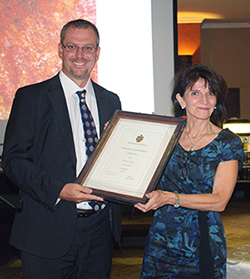
Vanya Terblance (ABSA Trust representative) hands over the award to Penny Siopis
Photo: Valentino Ndaba |
On Friday 4 December 2015, Penny Siopis, the well-known Cape Town-based artist, who has been exhibiting her work locally and internationally since 1975, was presented with the 2015 Helgaard Steyn Award and a prize of R 550 000 for her painting entitled Swarm.
A quadrennial award lunch was hosted by the University of the Free State (UFS) Johannes Stegman Gallery in conjunction with the Helgaard Steyn and ABSA Trusts. The Helgaard Steyn Trust was established by the estate of Dr Jan Steyn and was named after his father and his brother who was the last president of the Orange Free State Republic.
Swarm, a 2011 painting using ink and glue on canvas, depicts a swarm of bees in a complex, dynamic, and intense manner. It earned the prestigious award that is dedicated to the promotion of artistic culture based on the adjudicators’ unanimous decision. Angela de Jesus, curator of the Johannes Stegmann Art Gallery at the UFS, Annali Dempsey of the University of Johannesburg Gallery, and Prof John Botha, Associate Professor in Art History at North West University, made up the 2015 panel of judges.
On receiving the award, Siopis thanked the Steyn family, the judges, and the people who nominated her. “I am struck by how fantastic it feels to be acknowledged. It is extraordinary when people are struck by what was your own world and the intensity buzzing in your head.”
According to Prof Botha, “Naturally the work of art is chosen on grounds of artistic merit and in the context of contemporary values with regards to both form and content.”
The award-winning painter studied Fine Arts at Rhodes University and Portsmouth University in United Kingdom. Apart from lecturing Fine Arts at the University of the Witwatersrand, she is an honorary professor at University of Cape Town Michaelis School of Fine Art. She has also taught at the Natal Technicon in Durban.
Siopis has received numerous awards for her work, including a British Council Scholarship, a Merit Award at the 2nd Cape Town Triennial, and the Atelier Award for a residency at the Cité Internationale des Arts in Paris, in addition to the Alexander S Onassis fellowship for research in Greece.